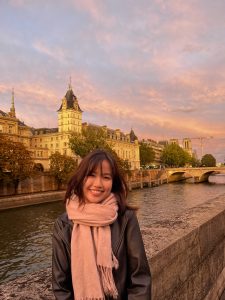For our final Women on Wednesdays interview of the term, we’ve talked to Su Ann Lim, a fourth-year student on the MSci Physics with Theoretical Physics course, who is also Secretary of WiP!
Introduce yourself! What do you like to do outside of physics?
My name is Su Ann and I am currently a 4th year undergraduate in the Theoretical Physics course. I’m also the Secretary for the Women in Physics committee this year and I feel so lucky to be part of a community of strong, intelligent women. I come from Kuala Lumpur, Malaysia and getting the chance to live and study in London for the past 4 years has been amazing! There’s such a wide variety of people here, especially Imperial, so it’s been really nice getting to meet people from so many different cultures. Some things I do when I’m not struggling over my problem sheets are bouldering, listening to k-pop, reading and watching anime!
How did you come to study Physics?
When I was younger, I always found myself inclined toward the Science and Maths subjects. I was also especially lucky to have teachers in those subjects who truly cared about our learning and always pushed me to explore beyond what was taught in the syllabus. They helped foster my interest in how things work and how the world works, which is what pushed me to apply for Physics in university.
What is your current MSci project about?
My project is a theoretical project based on General Relativity and Time Dilation. It aims to answer whether it is possible to detect planets within our Solar System that lie further out than Pluto (referring to predictions of “Planet Nine”) by investigating minute differences in time measurements by atomic clocks placed at various points in space.
In theory, this is possible due to General Relativity; orbiting planets result in changes to the gravitational potential at any point in space, this corresponds to changes in the space-time metric which results in time dilation between clocks placed at different points in space. More specifically, my project aims to determine the sensitivity of the atomic clocks required to measure such small time perturbations, as well as determine appropriate locations to place these atomic clocks.
What has your experience studying Physics and being a woman in Physics been like?
During my first year, I was definitely thrown off by the sheer depth we go into during the course. Teaching everything from first principles was not something I was used to and it truthfully sometimes frustrated me that we would spend ages deriving an equation I already knew! Over time I realised the importance of building my knowledge in this way; it forced me to sit down and question whether I really understood what I was looking at and not mindlessly applying formulas and methods I learnt in lectures. Despite the stress and workload studying at Imperial comes with, the sense of academic fulfilment definitely makes it worth it.
In terms of being a woman in Physics, I believe I was somewhat accustomed to the gender ratio due to the majority of my A-level Maths and Science classes also being male dominated. That being said, it did make it harder for me to speak up during tutorials and group work. I feel like this makes the Women in Physics community and friendships with other girls from my course even more valuable.
